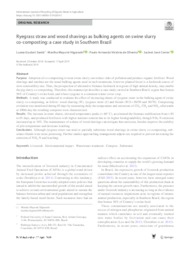Ryegrass straw and wood shavings as bulking agents on swine slurry co-composting: a case study in Southern Brazil.
Ryegrass straw and wood shavings as bulking agents on swine slurry co-composting: a case study in Southern Brazil.
Author(s): SARDÁ, L. G.; HIGARASHI, M. M.; OLIVEIRA, P. A. V. de; COMIN, J. J.
Summary: Abstract Purpose Adoption of co-composting to treat swine slurry can reduce risks of pollution and produce organic fertilizer. Wood shavings and sawdust are the usual bulking agents used in such treatments, however planted forest is a feedstock source of slow renewability rate. Thus, the prospection of alternative biomass feedstock in regions of high animal density, may enable the pig slurry co-composting. Therefore, this manuscript describes a case study carried in Southern Brazil, region that houses 56% of Country?s swine herd, and where ryegrass is a common winter cover crop. Methods A study was conducted to evaluate the efect of increasing shares of ryegrass straw in the bulking agent of swine slurry co-composting, as follow: wood shaving (W), ryegrass straw (S) and blends (W/S=50/50 and 30/70). Composting evolution was monitored during 85 days by measuring daily the temperature and emissions of CO2, CH4 and NH3, afterwards at 100th day the resulting composts were characterized. Results The increase in straw shares, elevated temperature peaks (>60° C), accelerated the biomass stabilization from>85 to 65 days, and produced fertilizers with higher nutrient content due to its higher biodegradability, though NH3-N emission increased up to 10%. The maintenance of a share of wood shavings can mitigate that emission, besides improve the stability of pile temperature and decrease leaching. Conclusions Although ryegrass straw can total or partially substitute wood shavings in swine slurry co-composting, substrates blends were more promising. Further studies approaching management adjusts are required to prevent increasing the emission of NH3-N and leaching.
Publication year: 2019
Types of publication: Journal article
Unit: Embrapa Swine & Poultry
Observation
Some of Embrapa's publications are published as ePub files. To read them, use or download one of the following free software options to your computer or mobile device. Android: Google Play Books; IOS: iBooks; Windows and Linux: Calibre.
Access other publications
Access the Agricultural Research Database (BDPA) to consult Embrapa's full library collection and records.
Visit Embrapa Bookstore to purchase books and other publications sold by Embrapa.

